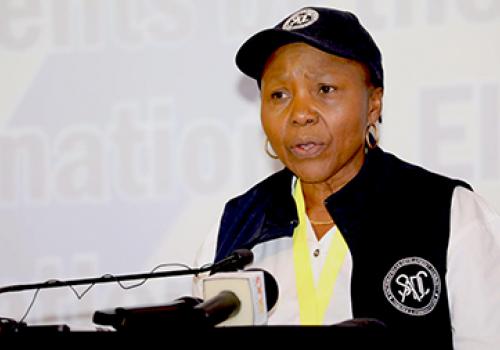The Head of the SADC Electoral Observation Mission (SEOM) to the 2019 Presidential and National Assembly Elections in the Republic of Namibia, Hon. Mrs Oppah Muchinguri-Kashiri, Minister of Defence and Veterans Affairs of the Republic of Zimbabwe on 29th November, 2019 presented the SEOM’s Preliminary Statement, highlighting the Mission’s observations of the pre-election and voting processes.
The Head of SEOM was accompanied by the Former Minister of Justice of the Republic of Zimbabwe and Alternate Head of the SADC Electoral Observation Mission, Honourable Patrick A. Chinamasa and the SADC Executive Secretary, Her Excellency Dr Stergomena Lawrence Tax. The event was attended by senior officials from the Government of the Republic of Namibia, Ambassadors and Heads of Diplomatic Corps, representatives of United Nations agencies, SADC Ambassadors accredited to Namibia, representatives of political parties, Civil Society Organisations (CSOs), Electoral Commission of Namibia, government ministries, the Police, religious and traditional leaders, academia, and the media fraternity.
In the Preliminary Statement, the Head of Mission applauded the level of compliance with the Electoral Law and the Electoral System stating that the Electoral Commission of Namibia (ECN) had generally followed the country’s electoral laws and the electoral system in the execution of its duties. Furthermore, she said that political parties also showed respect for the country’s electoral laws and conducted their campaigns with due regard to the rule of law. The Head of Mission also commended the people of Namibia for maintaining political maturity and for their peaceful conduct during the elections, which she described as generally peaceful, organised and conducted in a professional manner enabling voters to express their democratic right. She further noted that the political and security environment in the pre-election and election period was calm with no visible political and security risk.
The Republic of Namibia was using the Electronic Voting Machines (EVM) for the second time since the 2014 elections. The Head of Mission alluded to the concerns surrounding the use of Electronic Voting Machines (EVMs) stating that its lack of Voter Verifiable Paper Audit Trail (VVPAT) raised persistent perceptions, among the electorate and stakeholders, that they were not secure and could be hacked or manipulated and potential compromise the integrity of the electoral process. She said the lack of trust in the EVMs was further compounded by the loss of some of the EVM units, under unclear circumstances, which were lent to the ruling SWAPO Party in 2017. Moreover, there were issues arising from EVMs in several polling Stations relating to non-functional units, which delayed the opening or disrupted the voting and verification processes. The Mission recommended that relevant authorities take necessary steps to give effect to the provisions of the Electoral Act, as this may contribute to increasing public confidence in the electoral system, and in the use of EVMs. The need for voter education on the use of the EVMs was also raised.
The Mission further recommended that the National Assembly should consider amending the Electoral Act to ensure that the votes from special voting should be counted together with those from the main election in order to minimise speculation and undue influence on voters.
The release of the SADC Preliminary Statement was held in conjunction with the African Union Electoral Observation Mission (AUEOM), headed by H.E. Ernest Bai Koroma, Former President of the Republic of Sierra Leone; the Commonwealth Electoral Observation Mission, headed by Mr Musa Mwenye, former Attorney-General of the Republic of Zambia; and the Electoral Commissions Forum of SADC Countries (ECF-SADC) headed by, Mr Emmanuel Magade, Deputy Chairperson of the Zimbabwe Electoral Commission (ZEC).
His Excellency Emmerson Dambudzo Mnangagwa, President of the Republic of Zimbabwe, in his capacity as the Chairperson of the Organ on Politics, Defence and Security Cooperation, constituted SEOM to the elections in Namibia which deployed 59 observers in all the 14 provinces of the country. SEOM will issue its Final Report within thirty (30) days of the conclusion of the electoral cycle in accordance with the revised SADC Principles and Guidelines Governing Democratic Elections (2015).

